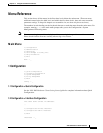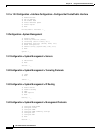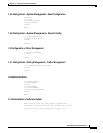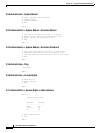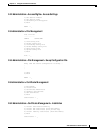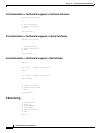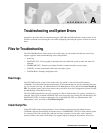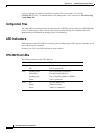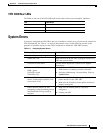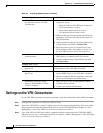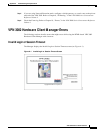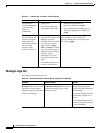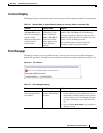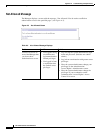
A-1
VPN 3002 Hardware Client Reference
OL-1893-01
APPENDIX
A
Troubleshooting and System Errors
Appendix A describes files for troubleshooting the VPN 3002 and LED indicators on the system. It also
describes common errors that might occur while configuring and using the system, and how to correct
them.
Files for Troubleshooting
The VPN 3002 Hardware Client creates several files that you can examine and that can assist Cisco
support engineers when troubleshooting errors and problems:
• Event log.
• SAVELOG.TXT—Event log that is automatically saved when the system crashes and when it is
rebooted.
• CRSHDUMP.TXT—Internal system data file that is written when the system crashes.
• CONFIG—Normal configuration file used to boot the system.
• CONFIG.BAK—Backup configuration file.
Event Logs
The VPN 3002 records system events in the event log, which is stored in nonvolatile memory
(NVRAM). To troubleshoot operational problems, we recommend that you start by examining the event
log. To view the event log, see Administration | File Management | View, and click on View Saved Log
File. To configure events, and to choose the events you want to view, see Configuration | System | Events
and Monitoring | Filterable Event Log.
The VPN 3002 automatically saves the event log to a file in flash memory if it crashes, and when it is
rebooted. This log file is named SAVELOG.TXT, and it overwrites any existing file with that name. The
SAVELOG.TXT file is useful for debugging. To view SAVELOG.TXT, see Administration | File
Management | View, and click on View Saved Log File
.
Crash Dump File
If the VPN 3002 crashes during operation, it saves internal system data in nonvolatile memory
(NVRAM), and then automatically writes this data to a CRSHDUMP
.TXT file in flash memory when
it is rebooted. This file contains the crash date and time, software version, tasks, stack, registers,
memory, buffers, and timers which help Cisco support engineers diagnose the problem. In case of a



